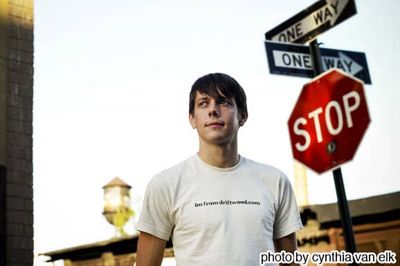Dressed in a white hooded sweatshirt and a faded pair of jeans, Nathan Manske could easily have passed for a Vanderbilt student strolling into Nashville's
Manske, a copywriter based in Brooklyn, is the creator and editor of the gay, true-stories blog I’m From Driftwood, a website devoted to telling the stories of GLBT individuals across the country. Driftwood, a small town in Texas located 40 miles from Austin, is where Manske grew up before moving to New York City in 2003. This rural upbringing has shaped his perspective and inspired him to educate others about gay people in America. Throughout the course of our one-hour conversation, he speaks with an intelligence and genuine interest in the subjects he portrays on his website.
Among these subjects: the 21-year-old man from Manhattan, Kan., submitted to conversion therapy by his parents, the New York state politician who struggled for years with his sexuality, and the California couple who endured a difficult adoption process. These battle-tested individuals, with their honest and heartfelt accounts, make up the fabric of gay America.
As does Manske, 29, whose work has been featured in commercials for national companies Lincoln, Sony and Hertz, among others. He was the creative mind behind the “rejected by eHarmony” television ads that challenged eHarmony’s infamous non-gay matchmaking policies.
Due to the economic downturn, Manske was laid off from his job in spring 2009. Beset by his own personal troubles, he decided to focus his energies on satisfying his creative muse.
Manske drew inspiration for this project from the Academy Award-winning motion picture Milk. One particular image from Harvey Milk's life stood out: a photograph of him riding on the hood of a car in a San Francisco Gay Pride march, holding a sign that reads, “I’m From Woodmere, N.Y.” The sign was intended to show how far people came to attend the San Francisco rally, and it sparked an idea for Manske.
Manske and his video director, Marquise Lee are now immersed in a 50-state van tour to collect stories and host reading events at cafes, community centers and college campuses, and they will post a video blog of their journey. Their trip to Nashville resulted in a meeting with Robbie Maris, a Belmont University senior and president of Bridge Builders, an unofficial GLBT student group that has been rejected twice by school officials.
According to Manske, all of these stories peel back the layers to add a more personal touch in the ongoing conversation about gay rights. One special story must stand out among the rest, right?
Manske considers this a moment, sips his coffee and laughs softly.
"It's always changing actually," he says after a long pause. "As time passes and the immediate impact goes away, they gain new meaning. I never ask people what their stories are going to be. I'm a big listener, and I encourage just to speak from their own personal experience. It's all happened very naturally."
"A true story can do a lot of different things," he continues. "We can all do our best to try to find similarities with others. This is a way of giving people a personal connection. It's easy for the average person to say that you're pro-gay or you support gay people, but meeting with them or hearing their personal stories really hits home. For some, this is their first real look into the lives of gay people."
Nashville marked the midway point of Manske's journey, and the variety of stories has allowed him to stretch the project to unforeseen heights. His search explores themes beyond the familiar tropes presented in the media.
"Being gay isn't just about your coming-out story," Manske says. "But you don't just come out once. You have to come out for your entire life, whether you're telling your boss or your co-workers or whoever is in your life. It's a giant hurdle that's place in front of you, but I want to share the positive things, too. My goal is to tell different stories that are diverse and show a sense of community."
In the midst of his four-month excursion, Manske, named one of Advocate's 40 Under 40 last year, has admitted struggled to gain some semblance of normalcy in his life. But he says that this project has stirred his desire to press forward despite the obvious challenges. In 2011, he will seek out other avenues to share these organic representations of the GLBT population in the United States.
"My pet peeve is someone telling me that their story is no good, or it's boring or uneventful," he says softly and smiles. "What might seem boring to them can be really interesting to someone else. You want to make these people feel important, because they are."
